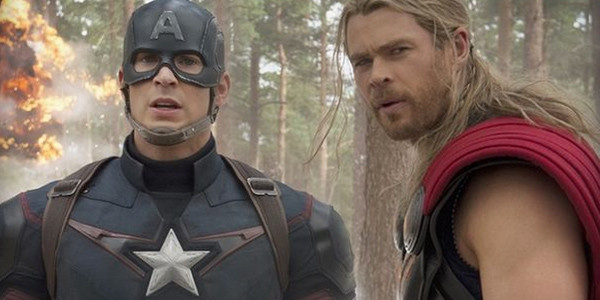
As we head into the second half of 2015, it’s time to look back and consider what the last few months of movies has to offer. Personally, I’ve found this year to be—in one word—disappointing. The pundits who earlier in 2015 declared this to be “the year for movies” didn’t say whether it would be the year for great ones. The most eagerly anticipated blockbusters—Jurassic World, Avengers: Age of Ultron, Furious 7—gave us quickie pleasures and satisfied the easily quenchable desires of their respective fanbases, but have no true staying-power beyond that. In retrospect, it’s been a year for bucks, not boldness. I’ve yet to experience that cataclysmic new-movie-love that defined so many of the best films of last year—Linklater’s Boyhood, Fincher’s Gone Girl, and Miyazaki’s The Wind Rises, to name the most striking examples.
But 2015 has provided me some memorable movie experiences. Sometimes, I was greeted with immense artistic vision, and sometimes I was served absolute shit-on-a-stick, but nonetheless here are five of the most striking movie outings I’ve taken this year.
***
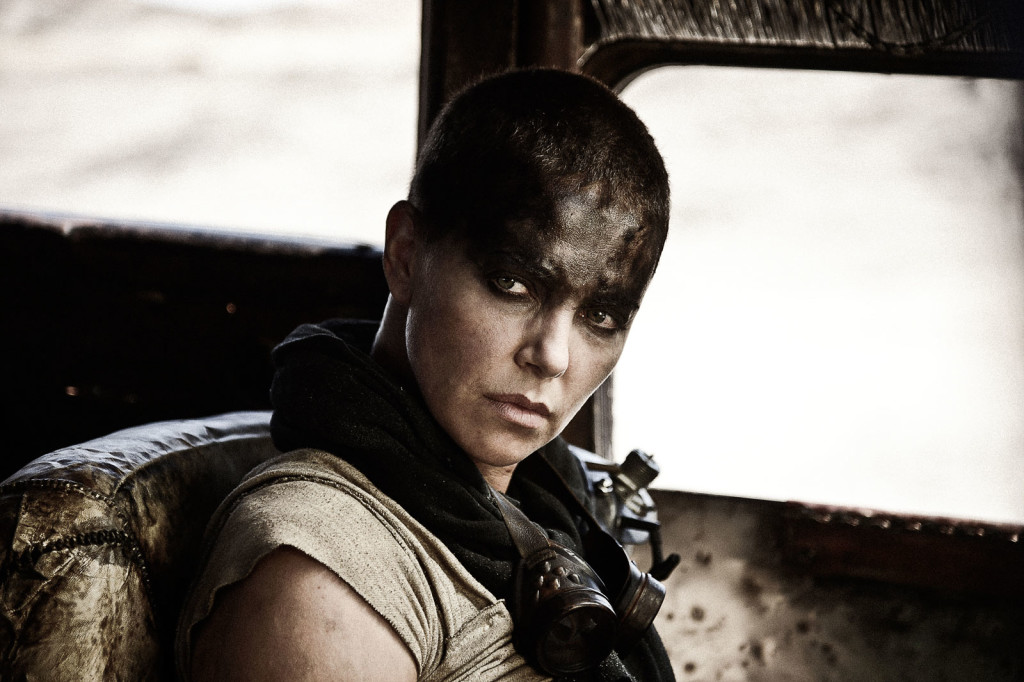
Mad Max: Fury Road (dir. George Miller)
Imagine my shock and awe when I saw this and realized it wasn’t as dumb and screechy as the trailers made it out to be. Perhaps I shouldn’t have underestimated it, though, when I realized that director George Miller’s track record—the Mad Max Australian road epics, Babe: Pig in the City, and the Happy Feet movies—more than proved how deeply dedicated he is in delivering high-quality products. And at age 70, Miller shows no signs of slowing down with Mad Max: Fury Road—his latest, dizzying delight.
It gives no fucks as it takes you on a trip across a war-ravaged Australian outback that’s as unforgiving as the desert in Lawrence of Arabia. It forces you into an octane-induced frenzy of orgasmic glee with its fantastical images of flamethrowing guitarists, motherly cults, and ass-kicking pregnant queens. It’s a love letter to action movies, celebrating 100 years of the best action flicks in cinema’s short history, and citing directors from Buster Keaton to John Ford and everybody in between. Its eccentricity is unmatched—it’s the kind where you’re expected to accept people who are called “Toast the Knowing,” “The Doof Warrior,” “Nux,” and (my personal favorite) “Rictus Erectus.” Certainly one of the most accomplished blockbusters of its kind.
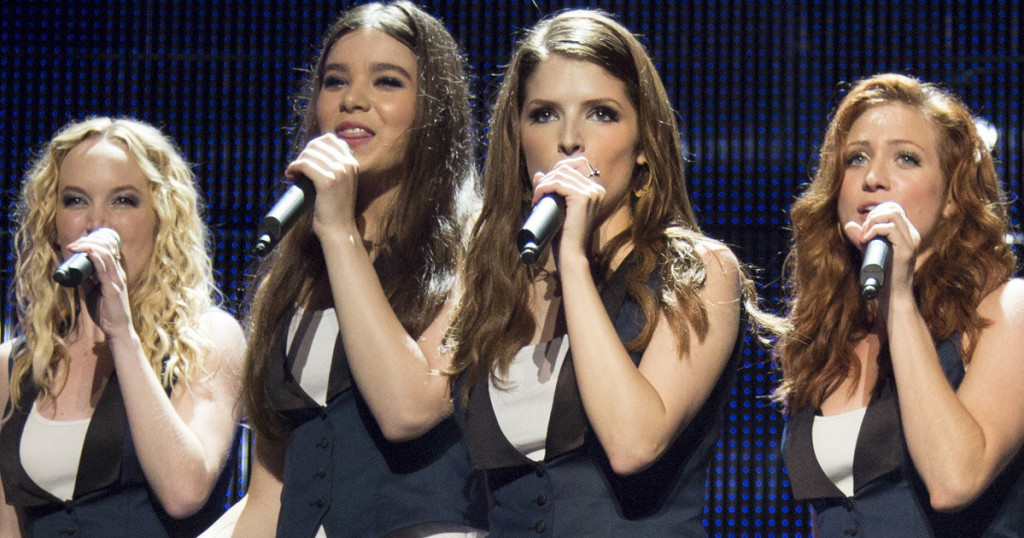
Pitch Perfect 2 (dir. Elizabeth Banks)
Two of 2015’s biggest movies, the aforementioned Mad Max and Pitch Perfect 2: Electric Boogaloo, came out on the same weekend. Because of the circumstances, I went to see Pitch Perfect 2 first, with some friends who had seen the first film (I hadn’t) and who were more-or-less rabid fans of the Barden Bellas. Honestly, I didn’t know what to expect. I did laugh at most of the jokes in the first half, even if it was all mostly self-conscious racial humor from a very obvious bigot announcer who I’m told was in the first movie, too. Him, I had no problems with.
What I have a problem with, however, is the downright vile depiction of the other girls of color in the movie. I thought Hollywood had moved past the inglorious days of Mickey Rooney’s bucktoothed Japanese caricature Mr. Yunioshi in Breakfast at Tiffany’s, past using a racial character as pure comedic fodder. Guess I was wrong. Pitch Perfect 2 contains one of the more despicable screen concoctions of our times: not one, not two, but three ladies (a Latina, a black lesbian, and an silent Asian girl) who are not once believable humans, whose color (and, in one case, sexual orientation) defines everything about them, and who are sidelined in favor of the white chanteuses to whom they must bow down. The worst of the lot is a Guatemalan Bella who provides a running-joke throughout the movie that she can’t do much but sit and look pretty because she can get deported at any moment. That’s no exaggeration—nearly every single time she’s up on the screen, she brings up her impending deportation to the other girls, who react with nonplussed bemusement. The Guatemalan comes from a large family, she’s speaks in a Speedy Gonzalez-esque drawl that would make Mel Blanc rise up in anger, and she’s by far one of the most troubling representations of an entire race of people I have ever seen in a movie. (And I’ve seen The Birth of a Nation, for fuck’s sake.) As a Hispanic, I was appalled that this sort of bigoted bullshit was even in the movie in the first place.
The only good parts of the movie are, ironically, the ones without the Bellas—Keegan-Michael Key steals every scene he’s in as a hipster-hating, megalomaniac record producer, and David Cross delights as an effeminate millionaire eccentric straight from the stock-character pile of Arrested Development. They sing well, sure, but surely that’s not the only reason why we go to movies like PP2. If we only came to hear Gene Kelly sing and dance in his movies, for instance, we’d only be in there for 30 minutes and leave. No, we come for the humor, the characters, the storylines—everything you expect in an ordinary movie—and Pitch Perfect 2 is morally bankrupt in all three respects. It prefers to get cheap jokes out of all the colors of the spectrum—black lesbian, illegal immigrant, obese girl—over having a smart, risible screenplay that doesn’t have to rely on that brand of stereotypical humor.
I hate to be that guy, but man—Glee does this stuff so much better. And without all the jokey, racist banalities to boot.

Ex Machina (dir. Alex Garland)
What?! A cerebreal sci-fi mindfuck that doesn’t just try to copy Kubrick’s 2001: A Space Odyssey in the most obtuse ways possible?! Such a thing exists?!
Well, Alex Garland makes it exist with Ex Machina, a (mostly entertaining) exploration of artificial intelligence and the limits of human ingenuity. It stars Oscar Isaac (of Inside Llewyn Davis acclaim) as an oversexed coding genius who has developed a new type of AI in the form of a sexy fembot named Ava (Alicia Vikander). Isaac contracts a young computer whizz named Caleb (Domhnall Gleeson) to serve as the human component of a Turing test. Isaac wants to see if Ava, the smart computer, can convince Caleb, the dumb human, that she is, in fact, human and capable of conscious thought.
For the most part, Ex Machina was an enjoyable ride. This is Garland’s first outing as a director and though he has a pretty thorough handling of the basics, he’s not quite there. He abuses his only interesting visual gimmick—a bunch of reflection-shots that make it look as if the characters are talking to clones of themselves in the mirror. It’s cool-looking, but it’s the equivalent of your stoner-artist-friend whispering to you, “Look how uber fucking rad this looks…” as he doodles out his latest “masterpiece.” Thematically, it’s an incredibly cynical film. It’s littered with the kind of “God is dead” gloom-and-doom that has come to define so many modern cerebral flicks. Still, one has to admire Garland’s chutzpah in suggesting that the Gods of Silicon Valley today are porn-obsessed, oversexed loners whose idea of a good time is working out 24/7 and partying alone with a handle of cheap vodka.
Those irksome hiccups aside, however, Ex Machina is a dazzling film: a fascinating look into the increasingly sophisticated world of AI that doesn’t pander to its audience’s intelligence (unlike Christopher Nolan’s diet-Kubrick space melodrama Interstellar). It is exciting, engrossing, and provides an answer to the question “Can machines think?” that is sure to unsettle many.
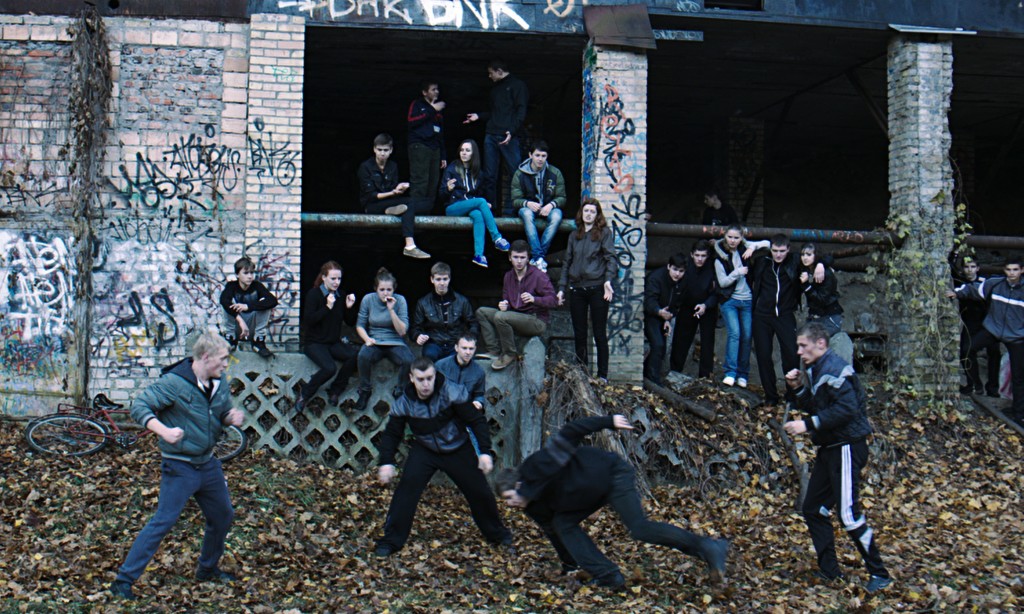
The Tribe (dir. Myroslav Slaboshpytskiy)
More like The Tripe, if you ask me.
This Ukrainian underground flick is making waves across the arthouse circuits, as many critics and audiences are praising it for its daring technique—the entire film is in Ukrainian sign language, with no subtitles, shot in lengthy long-takes. But take away the flashy “look at me!” whirlygigs that comprise The Tribe’s form, and what you’re left with is a vile, turgid mess of a movie that’s hopelessly confused about what it wants to say.
The basic premise follows Serhiy, the new kid at a Ukrainian school for the deaf as he gets roped into a seedy underbelly of crime at the school. You see, there’s a secret syndicate of criminals at this school made up of teen prostitutes, smugglers, petty thieves—and the bosses want Serhiy to be the newest member of their organization. He’s sucked into the life of crime, becomes a pimp for two of the girls there, and loses a bit of his humanity in the process. (Not that the film ever showed it existed in the first place.)
The Tribe is nothing but a ridiculous, artsy exploitation-film, its innovative technique upended by its insipid content. It is a deaf Clockwork Orange with no point behind its shocking imagery. Myroslav Slaboshpytskiy, the film’s director, merely slaps together one horror after another and fills in the dead space with pretentious artsy ennui and dishonest sexual curiosity. It pretends to look meaningful and philosophical, but its true intention is to get cheap shock-reactions out of the viewer with its smorgasbord of pornographic hanky-panky, back-room abortions, and post-abortion rape. Be wary of movies like The Tribe which pretend to look like art, but are really trashy exploitation flicks dressed up as arthouse genius.
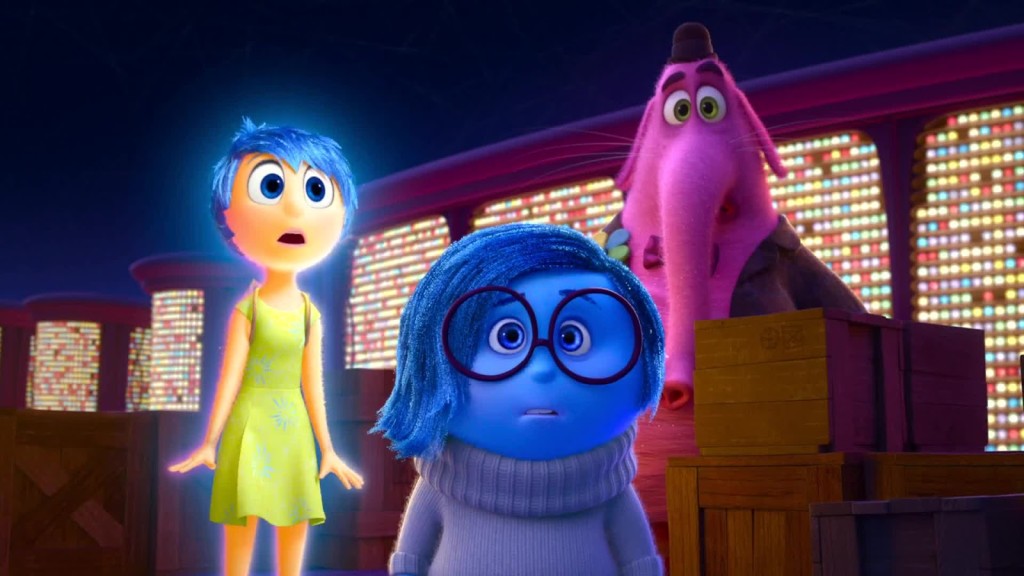
Inside Out (dir. Pete Docter and Ronnie Del Carmen)
And bam! comes Pixar to save this lackluster year with the momentously imaginative trip into the human psyche that is Inside Out. The story is simple, deceptively so: Riley Anderson and her parents have moved from the rural Midwest to the big city—San Francisco, to be exact—where Dad has found a new job. She feels immense discomfort with the move, and through a series of increasingly hysterical events, her emotions go haywire as she rethinks her simplistic life up to this point. But Inside Out’s gripping drama doesn’t come to us from the outside—that is, between Riley and her parents. It all occurs inside Riley—inside her mind, and between the anthropomorphized emotions of her brain—Amy Poehler’s Joy, Phyllis Smith’s Sadness, Mindy Kaling’s Disgust, Bill Hader’s Fear, and Lewis Black’s Anger—as they work frantically to figure out what’s wrong with Riley.
Every single shot of Inside Out is filled with the careful attention to detail, the pristine splotches of color, and the warm, humanistic depth of character that are the hallmarks of Pixar at its shining best (Toy Story 2, Wall-E, Up). It never bites off more than it can chew, successfully simplifying the magnificent complexions of the human mind into a palatable, kid-friendly format that’s aesthetically pleasing at the same time. Its stellar cast, a slew of comedians from NBC (Poehler, Hader, Kaling) and Comedy Central (Black), support the bulk of the movie’s genuinely hilarious oomph. The kid at the center of the drama (12-year-old Riley Anderson, voiced by Kaitlyn Dias) provides Inside Out’s melodramatic weight and big heart. And you don’t have to be a kid to marvel at the beautiful artistry of Pete Docter’s unique cinematic world.
To those who are complaining about Inside Out’s apparent “misunderstanding” or “dumbing-down” of how human emotions work, I’ve only got a few words:
You point to me an American animated feature-film nowadays that has the wherewithal, the ambition, the confidence to not only tackle how we as humans feel, but also shows how the constant turmoil of these emotions results in complex issues like mental illness, depression, and bipolarism. Show me another popular kid’s movie that is as clear about its under-the-surface serious subject matter as Inside Out is. You can’t! They don’t exist! Until now.
And one final note: sadly, I was the only one in my theater who guffawed at Riley’s dad’s start-up t-shirt. That’s the subtle kind of Silicon Valley in-joke you can’t get anywhere else.
***
Overall, it’s been a not-too-impressive first half of the year, with only Mad Max and Inside Out being the obvious exceptions. But don’t let that get you down: there’s still a pretty exciting second half, with auteurs like David O. Russell (Joy), Steven Spielberg (Bridge of Spies), and Quentin Tarantino (The Hateful Eight) making their long-awaited returns to the silver screens with movies sure to please.
Photos courtesy of here, here, here, here, here, and here
